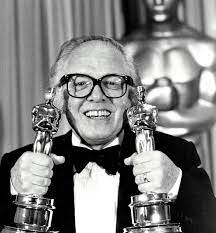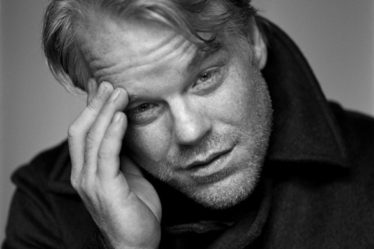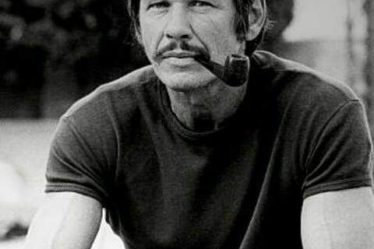
WARNING: This Article May Contain Spoilers
Born: 1st October 1890
Died: 30th January 1982 (age 91)
Stanley Augustus Holloway was born in Newbury Park, East London to a lawyer’s clerk and a housekeeper and dressmaker. He was named after the reporter and explorer Henry Stanley (he of “Dr Livingston, I presume?” fame). Stanley left school at 14 and become a junior clerk, this was around the same time his father left home and he started performing as a singer. At the age of 17 he started training as an infantry soldier in the London Rifle Brigade. He started his acting three years later in concert party variety shows in Walton-on-the- Naze and did summer seasons in Clacton for the following few years. At 23, Holloway met Leslie Nelson, who he regarded as a friend and mentor and the inspiration for the career that was to follow; this was also when he travelled to Italy, to train as an operatic baritone, and he toured America and South America with a concert party called The Grotesques. He returned to England, at the start of World War I to enlist with the Connaught Rangers. He spent his time in the war boosting morale by organising revue shows.
Holloway was mainly a revue and stage actor but when he was in his 30s he got his big screen debut (The Rotters) which led onto working with Ealing Studios and then the late Gracie Fields. He continued his film career through the Second World War by making propaganda films for the BFI and Pathé News and narrating films to boost morale. Yet it was when he was in his 50s that he made the films that he became famous for, even though probably his most famous role, Alfred P. Doolittle, came ten years later. He continued to work on stage and screen, both home and abroad, until he was in his 80s.
As usual with some of these older actors it is difficult to find five films that have a worldwide box office listing. Stanley Holloway only has two films listed so I have found a further five films from each of his acting decades. As usual I’ll start with his listed top two:
I love Stanley Holloway’s performance as Alfred P. Doolittle in My Fair Lady; he can sing (which is more than his leading co-stars), act and gives a rousing performance throughout. The east end dustman, you could say, is the comic relief who captures all our hearts with his honesty – even if we don’t agree with the way he goes about things. He is up against some big names yet can hold his own, if not lead, whichever scene he is in. In The Lavender Hill Mob Holloway is again paired with some strong names, most notably Alec Guinness. Pendlebury is a kind of bumbler, well both the main characters are really, but he is an honest man that takes a chance when it is offered to him. There are moments when Holloway could easily over play his role – like when he gets pins and needles whilst lying in wait for a burglar – but he never goes over the top. Normally you’d expect one of the leads in such a comedy to be the straight man and the other bring the laughs but Holloway and Guinness have this perfect relationship where they both share the limelight making for a very funny film. The scene where they are running down the stairs of the Eiffel Tower is brilliant, both are slightly taken with a touch of vertigo (not one to watch if you don’t like heights) but then they start laughing, for no specific reason, and it makes me smile every time especially when they are still spinning when they get out on the street.
Now for the films from his acting decades (and to be honest I struggled to narrow this down so picked films I hadn’t seen before)
Ten Little Indians (1965)
In this Agatha Christie whodunnit Holloway plays William Blore, a private enquiry agent (private investigator to you youngsters) who, along with eleven others, is invited to a remote house atop a mountain – only accessible by cable car – for a dinner party. I’m not sure if Holloway is supposed to be slightly posh but there were times when he did become a little cockney, not that that affected his performance which was exemplary. I’m not a huge Christie fan but I enjoyed this adaptation each actor kept the suspense going with a little sprinkling of light heartedness along the way which wasn’t totally left to those that have comedy backgrounds – hats off to the writers and director for that.
Alive and Kicking (1958)
Although he does not appear in the film for long, McDonagh is a constant character throughout. There is a hint of Alfred P. Doolittle in McDonagh; he is jovial and very up front (and he enjoys a drink!), the only difference is he has an Irish accent! Music and comedy is definitely where Holloway shines and it is hard to find something that I won’t watch he is so entertaining. If you can find this film to watch enjoy – especially his bleating (watch it and you’ll see what I mean!)
Wanted for Murder (1946)
Although almost a background character, the main story revolves around Chief Inspector Conway and Victor Colebrooke, Holloway’s Sargeant Sullivan adds a little light relief in what would be a very tense thriller otherwise. His dialogue is written well and it could be easily overplayed but in such an experienced actor’s hands there is the subtlety that is needed. This is a very good, well written thriller and not what you’d expect from a man whose raison d’être is comedy.
Cotton Queen (1937)
This is the sort of film that you’d feel good watching wrapped up with a nice cup of tea on a winter’s afternoon – something that will make you smile, laugh and not require much thinking. As Sam Owen Holloway is the owner of a cotton mill who is at loggerheads with his nearest competitor Todcastle. The friction between the two is light but it is when they are asked to merge things tend to get heightened that is until they get drunk together this is where the humour really comes to light; the scenes where Owen and Todcastle try their hand at target shooting and riding the dodgems is hilarious. I doubt that they really got drunk together but their acting is so realistic it is hard to know if they did or not. Holloway’s drunken rendition of ‘On Ilkley Moor Bar t’At’ is very good considering we know how good a voice he has to be so off key and slurring is something to behold. The script obviously lends itself towards the comedy but to pull it off in such a manner is an art in itself. Maybe not one of Holloway’s more well-known films but that does not take away anything of his performance.
My introduction to Stanley Holloway was probably through a monologue; I had attended an amateur dramatic society’s Old Time Music Hall and one of the actors recited Marriott Edgar’s ‘The Lion and Albert’ and I sort of became obsessed with it! I found a book of monologues in the library so I could learn it and then someone told me they had a copy of someone reciting it – that someone was Stanley Holloway, and not only was it ‘The Lion and Albert’ but it was other monologues as well (some of which he had written himself) and his recitations made me smile; little did I realise then that he was also an actor! To be honest his recitations led me to believe he was Yorkshire born so I was astounded by his very good ‘cockney accent’ in My Fair Lady, my first view of him as it were, and then his other films made me realise that he probably wasn’t from the North but it wasn’t until doing this article that I found out that he was born just down the road from me! My Fair Lady is probably what he is best known for but for me it was his collaboration with Ealing studios that (in my opinion) produced some of the best comedies of their time. He starred in three Ealing Comedies most notably The Titfield Thunderbolt (which I love as it’s about the restoration of a train), The Lavender Hill Mob and probably my personal favourite, Passport to Pimlico (and not just because Margaret Rutherford is also in it before anyone says anything). I think the film shows the strength and resilience of the Brits that we have all heard about that occurred during the Second World War. Holloway stars as Arthur Pemberton, local shop keeper who becomes the PM of Burgundy. What I like about Passport to Pimlico is that the role utilises Holloway’s linguistic elegance as well as his comedic expertise, like when he falls into the bomb crater.
Stanley Holloway was not only an actor he was also a writer, singer and comedian. At the age of 70 he was awarded an OBE for services to entertainment and eighteen years later the Variety Club of Great Britain honoured him with a special award. Holloway was married twice and had five children; his first wife died of cirrhosis of the liver after 24 years of marriage and he married the woman he classified as his “best friend” two years later. He is the grandfather of model Sophie Dahl through his son John’s relationship with Tessa Dahl. Stanley Holloway passed away at the age of 91 from a stroke and was buried alongside Violet, his second wife and mother of his son, John. Through his long career Holloway forged many strong friendship including such greats as Gracie Fields, Maurice Chevalier, Laurence Olivier, Frank Sinatra, Dean Martin and Groucho Marx.


